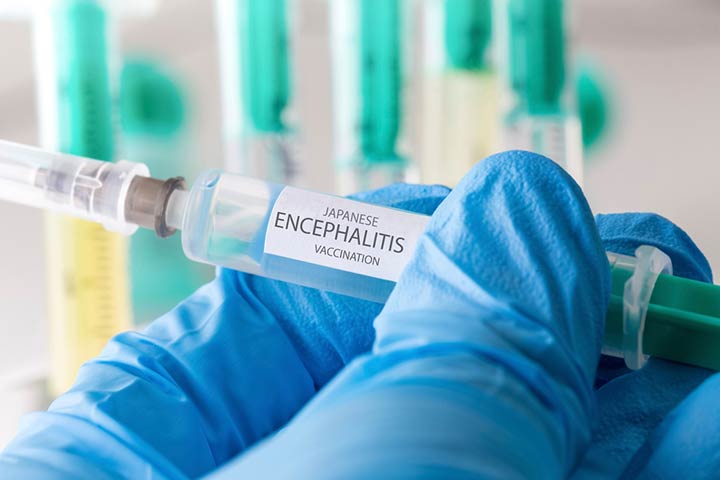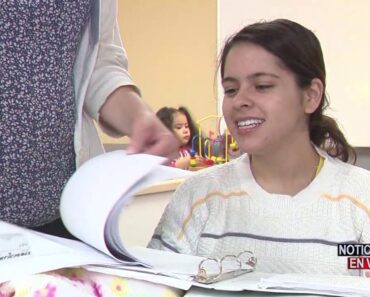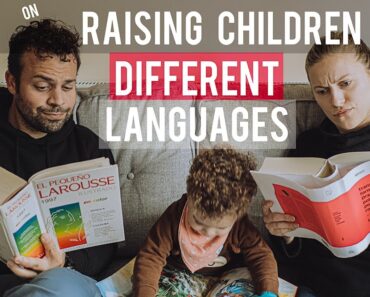Encephalitis is a severe central nervous system inflammation and infection involving the brain parenchyma (tissue). Viral infections are the most common causes of encephalitis in children, and the symptoms may vary from mild flu-like symptoms to severe neurological deficits.
Although up to 50% of children with childhood encephalitis may develop long-term complications, the mortality rates are significantly improved with early detection and initiation of treatment (1).
Encephalitis in itself is not contagious; however, the virus or other infectious agents causing it can be contagious. Adopting preventive and precautionary measures, especially during outbreaks, can reduce your child’s chances of contracting the infections.
Read this post to know about the types, causes, risk factors, symptoms, complications, prevention, diagnosis, and treatment options for encephalitis in children.
Types Of Encephalitis
Encephalitis can be divided into two categories depending on the cause (2).
- Primary encephalitis: This occurs when a virus or other causative agents directly infect the brain. This infection can be widespread or localized to one brain area. Primary encephalitis may result from reactivation of a virus that has been inactive after a previous infection.
- Secondary encephalitis: This is caused when a faulty immune system attacks the healthy brain cells in response to an infection elsewhere in the body. It may occur two or three weeks after an infectious disease and is often called post-infection encephalitis.
Causes Of Encephalitis In Children
The exact cause of encephalitis in children is often not known. However, when the cause is known, it is generally a viral infection. The common viral causes of encephalitis may include (2)(3)(4)
- Herpes viruses: Both herpes simplex virus (HSV) type 1, which causes cold sores, and herpes simplex type 2 associated with genital herpes, can cause HSV type 1 rarely causes encephalitis, but when it does, it can cause significant brain damage and even death. Other herpes viruses such as the varicella-zoster virus that causes shingles and chickenpox and the Epstein-Barr virus that causes infectious mononucleosis can also result in encephalitis.
- Mosquito-borne viruses: West Nile virus, La Crosse encephalitis virus, Western equine encephalitis virus, Louis encephalitis virus, Japanese encephalitis virus, eastern equine encephalitis virus, and Zika virus are some common causes of mosquito-borne encephalitis. The signs and symptoms of the infection may appear after a few days or weeks following exposure to the mosquito-borne virus.
- Enteroviruses: The poliovirus and coxsackievirus, which are enteroviruses associated with flu-like symptoms, abdominal pain, and eye inflammation, can also lead to encephalitis in children.
- Tick-borne viruses: The Powassan virus is a common cause of tick-borne encephalitis in the Midwestern United States. Bites from infected ticks or consumption of unpasteurized dairy products from infected cows, goats, or sheep can transmit this virus to humans, and the symptoms may appear a week after a bite.
- Rabies virus: This can cause rapid progression to encephalitis after the symptoms This virus can be transmitted to humans from an infected animal bite. Cases of encephalitis due to the rabies virus are rare due to effective vaccinations in various countries.
- Childhood infections: Measles (rubeola), German measles (rubella), and mumps are some common childhood infections that can result in secondary encephalitis. However, MMR vaccines have reduced the incidence of these diseases in many countries.
Other causes of encephalitis in children may include
- Bacterial and parasitic infections: Although viruses are the common causes of encephalitis in children, parasites, fungi, and bacteria can also cause encephalitis in rare cases. Tuberculosis, syphilis, and Lyme disease (tick-borne) are common bacterial infections that may result in encephalitis. Parasitic infections such as toxoplasmosis mediated by cats can also lead to encephalitis in children.
- Fungal infections: Fungi including candida and aspergillus can also cause fungal encephalitis in children.
- Non-infectious causes: A cancerous or noncancerous growth (tumor) in the body can also cause autoimmune
Encephalitis in itself does not spread from an infected person to others. Instead, the infectious agent is transmitted. Protecting your child from various infectious agents could reduce their risk of contracting encephalitis.
Risk Factors For Encephalitis In Children
Although anyone can develop encephalitis, the following factors may increase the risk for encephalitis in children (2).
- Weekend immune system: Children who have HIV/AIDS, take immunosuppressant drugs, or are under any medical conditions that can cause a weakened immunity are at an increased risk for encephalitis.
- Age: Children and older adults are vulnerable to most types of viral encephalitis and often develop severe encephalitis than other age groups
- Seasons and geographical regions: Incidence of mosquito- and tick-borne encephalitis may change based on seasons and geographical regions. This can be more common in the summer in many areas of the United States. Children who reside or travel to high-risk areas are more likely to develop mosquito-borne or tick-borne encephalitis than other children.
Signs And Symptoms Of Encephalitis
A viral infection can precede encephalitis in most cases. Gastrointestinal problems such as nausea, vomiting, and diarrhea and upper respiratory symptoms are commonly seen prior to the onset of encephalitic symptoms.
The severity and type of symptoms may vary in each child depending on the underlying cause and individual factors. The common signs and symptoms of encephalitis may include (5)
- Bulging fontanelle in young children
These symptoms can also be seen in other medical conditions, especially neurological problems. Therefore, it is advised to consult a pediatrician for an exact diagnosis if you notice any of the symptoms listed above in your child.
Complications Of Encephalitis In Children
The complications of encephalitis may vary depending on various factors, including age, underlying cause, the severity of the initial illness, and the time between the onset of encephalitis to treatment. Children with mild encephalitis may recover within a few days or weeks without any long-term complications.
Brain tissue injury due to severe inflammation can result in the following complications (2).
- Lack of muscle coordination
- Persistent fatigue and weakness
Also, the type and severity of complications may vary in each child depending on the brain area involved. In some children, these problems may persist for months, while in others, the complications may be permanent.
Diagnosis Of Encephalitis
The pediatrician may enquire about your child’s health and vaccination history to know the possible causes of encephalitis. They may also ask about the recent travel histories to know if the child has been to any mosquito- or tick-prone areas. The following tests are usually ordered for children with suspected encephalitis (6).
- Magnetic resonance imaging (MRI) is a non-radioactive technique to visualize the tissues. MRI with special dye (contrast) gives clear images of the brain parenchyma (soft tissues).
- Computed tomography (CT) scan uses X-rays to create images of the inside of the body. Certain brain changes specific to encephalitis are noted on CT scans.
- Blood tests and blood culture may help determine the presence of infections and inflammatory markers in the blood. NMDA receptor antibodies and other antibodies can also be identified in blood tests.
- A sputum culture may help identify respiratory tract infections in children.
- Stool and urine tests are also useful for determining the underlying causes of
- Spinal tap or lumbar puncture involves the collection of cerebrospinal fluid (CSF) using a needle. It enables the doctor to measure the CSF pressure in the spinal canal and brain to determine
- Electroencephalogram or EEG records brain electrical activity through electrodes placed on the scalp.
- Brain biopsy is done in rare cases to identify the exact cause. This includes the removal of a small sample of brain tissue for d
Doctors may order these tests based on the existing signs and symptoms and other risk factors. Some tests are also ordered during follow-up visits to ensure recovery.
Treatment For Encephalitis
The treatment for Encephalitis may vary depending on the underlying causes. Children with encephalitis often require hospitalized treatment for two weeks or a month, and intensive care unit (ICU) admissions are needed for severe cases.
Supportive care is provided for initial stabilization. Two to three days of intravenous treatment with antiviral medications for herpes simplex encephalitis and antibiotics for bacterial infections are often given while waiting for the laboratory analysis.
Specific medications are given after the cause of encephalitis is confirmed. Immunosuppressants such as high-dose steroids are recommended for children with autoimmune causes. Although most children may receive a single course of immunosuppressants, a few may require them for a longer time. Some children may need plasmapheresis (process to filter blood) and intravenous antibodies to manage autoimmune encephalitis(7).
If the causes are not identified, doctors may focus on preventing complications through medications or other methods while the child recovers from encephalitis. Children who recover from encephalitis are also provided with specialized training and therapies to improve their neurological functioning.
How To Prevent Encephalitis In Children?
Encephalitis may not be preventable in many cases. However, you can protect your child from various diseases that cause encephalitis. The following are a few preventive measures you can take to protect your child (8).
- Vaccinations: Providing all childhood vaccines as per the immunization schedule can help prevent various illnesses that cause encephalitis in children.
- Avoid contact: Avoiding being around a person infected with viruses that cause encephalitis may reduce the risk of transmission.
- Maintain hygiene: Washing the hands with soap and water or rubbing with alcohol-based sanitizer and following the cough and sneeze etiquettes may reduce the risk of viral and other infectious diseases in children.
- Avoid mosquito bites: Using mosquito repellents and nets, wearing protective clothing outdoors, and cleaning the waterlogged spots around the house can protect your child from mosquito bites.
- Avoid tick bites: Using tick repellents and wearing protective clothing can help avoid tick bites in travelers and residents of endemic areas. Avoiding consumption of unpasteurized dairy products is also recommended to prevent tick-borne
- Rabies vaccine: It is recommended to take rabies vaccines after a bite from stray animals, including bats and unvaccinated domestic animals. Ensure that the pets are up to date with their recommended vaccines.
You may keep your child safe from encephalitis by following these preventive and precautionary measures since these diseases are common in many places.
The prognosis of encephalitis may vary based on the underlying cause, severity, and treatment. Early detection and treatment may reduce the risk of brain damages in many children. It is recommended to seek pediatric help if your child has any neurological symptoms. Regular follow-up and recommended therapies, such as speech therapies and occupational therapies, based on complications are also essential to improve the child’s quality of life.


































